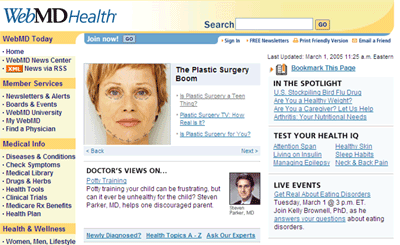
The NYT article "
Google and Microsoft Look to Change Health Care," run in the 14 August 2007 issue, talks about how the two giants are trying to integrate info technologies into healthcare. The key difference is that Google is approaching the consumer exclusively while Microsoft seems to be offering something to both sides of the fence, providers (e.g., hospitals and physicians) and consumers.
Some interesting tidbits from the article.
“What’s behind this is the mass consumerization of health information,” said Dr. David J. Brailer, the former health information technology coordinator in the Bush administration, who now heads a firm that invests in health ventures.
"A Harris poll, published last month [July 2007], found that 52 percent of adults sometimes or frequently go to the Web for health information, up from 29 percent in 2001." Furthermore, "58 percent of people who look online for health information discussed what they found with their doctors in the last year."
“The doctor is becoming a knowledge navigator,” [John D. Halamka, a doctor and the chief information officer of the Harvard Medical School] said. “In the future, health care will be a much more collaborative process between patients and doctors.”
"There are plenty of competitors these days in online health records and information from start-ups like Revolution Health, headed by AOL’s founder, Stephen M. Case, and thriving profit-makers led by WebMD."
"Indeed, it is the market reach and deep pockets that Google and Microsoft can bring to consumer health information that intrigues medical experts, and has lured recruits. Dr. Roni Zeiger, a graduate of Stanford’s School of Medicine, a medical informatics researcher and a former primary care doctor, joined Google last year. The 36-year-old, who still sees patients some evenings and weekends at a nearby clinic, said, 'At Google, I can use my expertise and knowledge to potentially help millions of people each day.'"
I have written about Microsoft's forays into healthcare
here and
here.
Google Health has been fleshed out apparently. Here are
some screen shots. And here's how the article described it:
"A presentation of screen images from the prototype — which two people who received it showed to a reporter — then has 17 other Web pages including a “health profile” for medications, conditions and allergies; a personalized “health guide” for suggested treatments, drug interactions and diet and exercise regimens; pages for receiving reminder messages to get prescription refills or visit a doctor; and directories of nearby doctors."
 Medicare recently announced it would not pay for 'hospital errors' or preventable illnesses, like hospital-acquired infections, according to the NYT article "Medicare Says It Won’t Cover Hospital Errors".
Medicare recently announced it would not pay for 'hospital errors' or preventable illnesses, like hospital-acquired infections, according to the NYT article "Medicare Says It Won’t Cover Hospital Errors".
